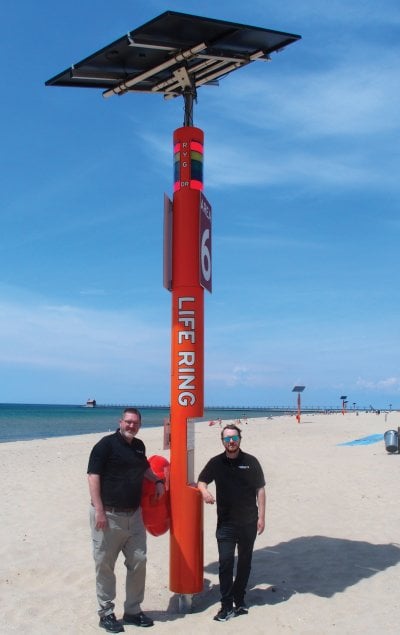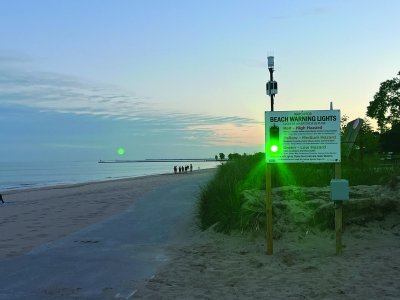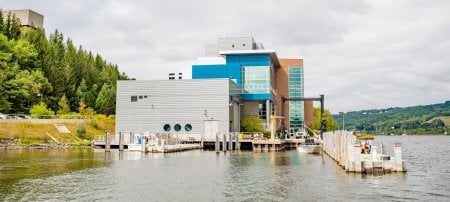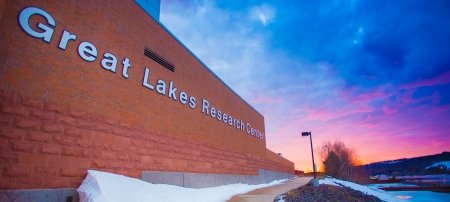The desire to save lives is a powerful motivator. But, it takes more than emotion to get a passion project to market and keep it growing. Just ask Jacob Soter, manager and co-founder of SwimSmart Technology, a company that specializes in warning and rescue systems that help prevent drownings and make beaches safer.
Soter cares deeply about saving lives. He also does his research, puts in the work and keeps the long game in mind. The habits he developed as a Michigan Tech engineering student working in the University's Enterprise Program only grew stronger when he found his niche in the College of Business through the Applied Portfolio Management Program (APMP) and went on to pursue a Tech MBA®.

Through SwimSmart, Soter has used every element of his Tech education to create a lifesaving lakeside innovation that's gaining traction—a beach safety signal tower that uses colored lights, like a traffic signal, to warn swimmers about dangerous water conditions.
SwimSmart's latest partners include the Michigan Department of Natural Resources, Michigan Tech's Great Lakes Research Center (GLRC) and the National Oceanic and Atmospheric Administration (NOAA) Wisconsin Shipwreck Coast National Marine Sanctuary.
In the Upper Peninsula, the company also partnered with the Innovate Marquette SmartZone, a collaboration leading to the installation of four SwimSmart warning towers to help solve staffing problems that have left three of the city's four beaches without lifeguards in recent years.
Soter came up with the core concept as an undergraduate student in Tech's Strategic Education through Naval Systems Experiences (SENSE) Enterprise. He collaborated with then-team advisor Andrew Barnard, who recently returned to the University in a new role as vice president for research.
"I'm proud to say that I was the first program manager of SENSE during its formative years. Dr. Barnard and Dr. Guy Meadows were the first two advisors and the program was run out of the Great Lakes Research Center," said Soter. "As a new Enterprise, everything had to be created from scratch: new projects, new teams, and the structure of the Enterprise. The new-venture aspect of SENSE is what drove me toward it instead of existing Enterprise teams."
The team's first project was to develop a cost-effective remote-controlled water rescue drone in partnership with the Keweenaw Bay Indian Community.
"During the project, the team attended a Great Lakes Water Safety Consortium conference, which provided us with an introduction to the world of water safety here in the Great Lakes," said Soter. "At that conference, I recall Andrew and I discussing the SwimSmart concept after listening to a presentation on the woes of the current beach warning flag policy utilized around the country."
Traditional flag warning systems aren't effective, especially on the many beaches where no lifeguards are present, because it's difficult to ensure conditions are being monitored appropriately. Someone has to change the flag when conditions warrant taking precautionary measures or staying out of the water entirely. Soter's innovation offers cellular-connected responsiveness, monitoring capabilities, and the ability to be operated remotely by busy municipal and state officials or private entities—essentially a contemporary upgrade.
Hands-on Learning is a Smart Business Proposition
Enterprise offered Soter a chance to become skilled in applied engineering, sourcing parts, working in teams and managing a budget. But when he graduated with his electrical and computing engineering degree in 2019, he knew he wanted more.
"An MBA gave me a more well-rounded skill set, providing me with a suitable foundation for pursuing a technology start-up."
"An MBA was something I always considered," said Soter. "Before pursuing engineering at Michigan Tech, I considered going into business law and had an interest in finance and accounting."
The MBA program, which Soter completed in 2020, wasn't his first experience with the College of Business. "In large part, I decided to pursue my MBA because of my work and relationships with the College of Business during the Applied Portfolio Management Program," said Soter.
"The APMP program was like no other. I found it through a programs page on the College of Business website. Dean (Johnson) and Joel (Tuoriniemi) created a rigorous but fulfilling oneyear program that required a lot of long nights, but they kept it engaging throughout," Soter said.
"Joel was my favorite professor during my career at Michigan Tech and it's tragic to hear of his passing," he added, referencing Tuoriniemi's death in a car accident in September 2023.
Soter encourages students across campus to apply to the APMP. "The biggest benefit to non-business majors is delving deep into fundamental analysis of a business," he said. "Decompiling financial statements, performing market research, and making evaluations are important skills for business executives, regardless of the size of the company. These skills have been instrumental as we prepare to complete our first investment round for SwimSmart."
As the SwimSmart concept developed, Soter found welcome testing grounds through other programs housed in or otherwise supported by the College of Business. "Pitch competitions and Husky Innovate in general provided me opportunities to take our design concepts and get feedback from other entrepreneurial-minded individuals," said Soter. "Before entering a pitch competition, you need to determine important metrics for your idea, such as the problem statement, value proposition, customer segments, and competitive landscape. Through our participation with Husky Innovate's miniature NSF I-Corps program, we had a leg up because we performed a thorough customer discovery that ultimately paved the way for how SwimSmart products look today."
Riding a Wave of Statewide Michigan Innovation
SwimSmart is helping entities who care about water safety as much as the company does to realize the full potential of technology-based safeguards and solutions.
"We're very excited about our partnership with the Michigan Department of Natural Resources," said Soter. "The DNR—and the State of Michigan as a whole—have been an excellent partner."
SwimSmart's first Michigan DNR state park installation, at Grand Haven State Park, is the company's largest to date. It features eight first-of-their-kind electronic beach rescue towers.
"Grand Haven State Park now stands as the benchmark for beaches around the country looking for new approaches to boosting beach safety," said Soter. "Tens of thousands of hours of work and over a million dollars in investment have brought us to this new rescue station concept. It's our initial attempt to create what we call 'the fire alarm equivalent for drowning.'"
The units feature a custom-designed 360-degree beach safety traffic light that uses a standardized color code—a five-light range that runs from green for go to red for no. They are also equipped with a patented triggered life ring cabinet (LRC). The flotation cabinet contains a life ring with 100 feet of rope. When the cabinet is opened, it triggers an alarm system with flashing lights and alarm chimes that also sends automated notifications to first responders. The triggered LRC also sets off alarms in the staffed buildings at the park, indicating the location of the emergency. Because the system is geo-located, the on-premises cameras automatically converge on the scene of the emergency, opening access to local 911 dispatchers.
"The system aims to dramatically decrease response time and reduce false positives," Soter explained, adding that the LRC was used in its first rescue this summer.

The beach towers are self-contained, wireless, and solar powered. The tower mounts are giant 10-foot screws sunk deep into the sand to hit a solid foundation. That means towers can be located nearly anywhere and moved as needed.
Other unique partnerships include installation of three SwimSmart devices along the Neshotah Beach coastline in cooperation with the City of Two Rivers, Wisconsin; in the Keweenaw Waterway near Michigan Tech's GLRC; and at NOAA's Wisconsin Coast National Marine Sanctuary. The device features a sign equipped with coastal cameras, a compact marine weather station, and a nearshore spotter buoy moored a few hundred feet offshore.
"This project aims to dramatically improve coastal forecasting, providing the City of Two Rivers with highly localized warnings specifically tailored to their beach," said Soter. "The data will also be shared with NOAA partners to improve regional forecasting capabilities. Artificial intelligence will be developed to detect hazards from the coastal camera and help calibrate larger models, such as NOAA's Nearshore Wave Prediction System. Sensors of this nature will pave the way for advances in coastal forecasting software that will eventually be replicated at beaches around the country."
Gathering the Tools to Persist and Succeed
Soter acknowledges that he hasn't chosen an easy path. "Entrepreneurship is a career choice, not a get-rich-quick scheme," he said. "No matter your industry or product, starting a company can take many years of hard work, sacrifices, and downright stubborn determination."
Soter advises fellow Huskies willing to dive deep and stay the course to form relationships with entities designed to foster entrepreneurs.
"Leverage all resources available to you," said Soter. "What I learned over time is that you actually do have colleagues—other entrepreneurs. Lean on that and ask questions of the successful ones. Find a mentor who sees the endgame, even when you lose that vision yourself. Involve yourself with supportive organizations that are here to support you, including Husky Innovate, MTEC SmartZone, the Michigan Economic Development Corporation, InvestUP, the Small Business Development Center … the list goes on."
Putting Innovation Passion into Action
While his business acumen and engineering skills have served him well, Soter continues to use the passion that motivated him—and the conviction that he can apply what he's learned to save lives—to fuel his ambitious endeavor. There were 85 Great Lakes drownings in 2023 and 71 to date this year as of August 2024, according to the National Drowning Prevention Alliance and Great Lakes Surf Rescue Project. The National Weather Service reports an average of 23 rescues annually due to current- and subsequent wave-related incidents.
"Ultimately, it's relationships we made with passionate individuals within the water safety community that motivate us to continue. Speaking with the friends and family of drowning victims left a permanent impression on me," said Soter. "Each new beach we bring on board brings so much fulfillment. It's also the belief that I can make a dramatic change that will forever impact water safety—this driving mission keeps me focused on the long term."
"Pursuing a deeply rooted passion will motivate you and bring you a sense of fulfillment that no salary, office, or title can match," said Soter.
For more information, reach Soter at the SwimSmart website.
Michigan Technological University is an R1 public research university founded in 1885 in Houghton, and is home to nearly 7,500 students from more than 60 countries around the world. Consistently ranked among the best universities in the country for return on investment, Michigan's flagship technological university offers more than 120 undergraduate and graduate degree programs in science and technology, engineering, computing, forestry, business, health professions, humanities, mathematics, social sciences, and the arts. The rural campus is situated just miles from Lake Superior in Michigan's Upper Peninsula, offering year-round opportunities for outdoor adventure.




